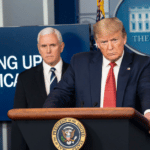





The Department of Justice has taken steps to revive a case against former President Donald Trump, which was previously dismissed by a federal judge.
The Missouri Independent reported that U.S. Special Counsel Jack Smith recently asked the U.S. Court of Appeals for the Eleventh Circuit to overturn the dismissal, which centers on Trump’s alleged mishandling of classified documents at his Florida residence.
This move comes as the legal battle involving Trump’s handling of sensitive materials continues to unfold, with the appeals process potentially extending beyond the November election.
The case, initially dismissed by U.S. District Judge Aileen Cannon on July 15, involves allegations that Trump improperly retained classified documents after leaving the White House.
Cannon, who was appointed by Trump in 2020, ruled that the appointment of Special Counsel Jack Smith was legally flawed. She based her decision on constitutional arguments related to the appointment and funding of “Officers of the United States.”
In response to Judge Cannon’s ruling, Special Counsel Smith filed an 81-page brief with the appellate court, challenging the dismissal.
Smith argued that the district court deviated from established Supreme Court precedent and misinterpreted the statutes that authorized his appointment. He also expressed concern that the rationale used in the ruling could have far-reaching implications for the Justice Department and other appointments within the Executive Branch.
Smith’s brief also cited a Supreme Court decision from the Watergate era, suggesting that precedent supports the legality of his appointment as Special Counsel.
The legal battle surrounding the classified documents case is expected to be prolonged, with the appeals process potentially dragging on for months.
This could delay any progress in the case until after the upcoming November election, adding another layer of complexity to Trump’s legal challenges.
Trump has faced a series of legal challenges since leaving office, and the classified documents case is just one of several ongoing investigations.
In June 2023, Trump and his aide, Walt Nauta, were indicted on 37 counts related to the mishandling of classified materials. This case marked the first time in U.S. history that a former president faced federal criminal charges.
The situation further escalated in July 2023 when a superseding indictment added more charges against Trump and introduced another co-defendant.
Despite these mounting legal troubles, Trump continues to be a prominent figure in U.S. politics and is set to accept the Republican nomination for the 2024 presidential election.
Shortly before the Republican National Convention, where Trump is expected to secure the nomination, the former president publicly supported Judge Cannon’s decision to dismiss the case. Trump had initially requested the case’s dismissal in February, arguing that the charges were politically motivated.
Judge Cannon’s dismissal provided a significant victory for Trump, who has repeatedly claimed that the investigations against him are part of a broader political witch hunt. However, Smith’s appeal seeks to challenge this ruling and bring the case back to court.
One of Smith’s key arguments in his appeal is that the district court’s rationale, if left unchallenged, could have serious consequences for the Justice Department.
In his brief, Smith warned that the decision could jeopardize the longstanding operations of the department and call into question hundreds of appointments throughout the Executive Branch.
This concern is particularly relevant as the Justice Department continues to navigate complex legal and political issues under the Biden administration.
Smith’s appeal aims to reinforce the legality of his appointment and ensure that the classified documents case can proceed without further hindrance.
Adding to the complexity of Trump’s legal battles, the U.S. Supreme Court ruled in early July that former presidents have immunity for official “core Constitutional” acts.
This ruling has implications for several of the cases Trump is currently facing, including the investigation into his attempts to overturn the 2020 election results.
Smith has been given until the end of August to assess the impact of the Supreme Court’s immunity decision on the election subversion case.
A pre-trial hearing in that case is scheduled for September 5, further intertwining the various legal challenges Trump is confronting.



